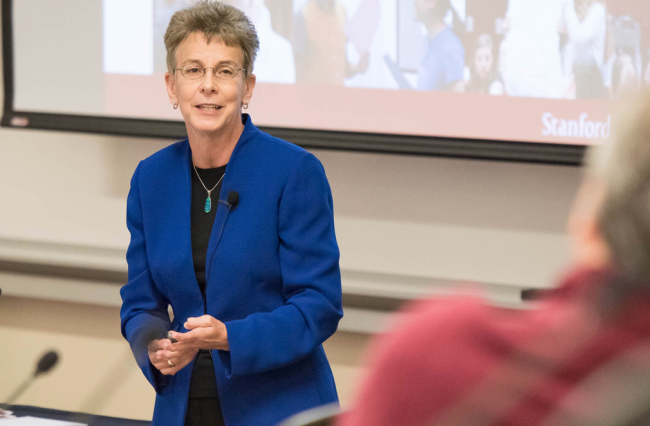You have /5 articles left.
Sign up for a free account or log in.

Patricia Gumport
Stanford University/L.A. Cicero
In changes aimed at improving the quality of graduate student advising, Stanford University’s Faculty Senate last week voted to require departments to spell out advising expectations for both professors and students.
The body also voted to limit who can serve as a principal dissertation adviser for Ph.D. candidates to current Stanford professors who are active members of the campus’s Academic Council.
Advising remains a key area of concern for Stanford’s 9,400 graduate students, as revealed during a recent planning process for graduate education and four years of student exit survey data, Patricia J. Gumport, vice provost for graduate education, told the Senate at its meeting Thursday.
“Our students’ daily experiences are impacting their education and academic progress as well as their well-being,” Gumport said, according to information from Stanford. “We take seriously all that they are telling us, and we are working together.”
Some 40 percent of students surveyed reportedly cited “availability of faculty” as an obstacle to their academic progress, while 27 percent cited advising as another roadblock.
Faculty members who are leaving Stanford for various reasons may now only serve as co-advisers with a current Stanford professor serving as principal adviser.
Faculty members emeriti recalled to active duty may serve as principal advisers.
Stanford students aren’t alone in their concerns about advising. Graduate students nationwide commonly cite poor advising -- from not feeling like a priority to one's adviser to advising that doesn’t relate to one's career goals -- as a major challenge.
A widely cited study published last month in Nature Biotechnology also linked lackluster advising across academic disciplines to mental health concerns. Among surveyed graduate students with anxiety or depression, half did not agree that their immediate mentors provided “real” mentorship. Responses were similar to questions about whether advisers and principal investigators provided ample support and whether they positively impacted students’ emotional mental well-being. More than half of respondents who experienced anxiety or depression did not agree that their advisers or PIs were assets to their careers or that they felt valued by their mentor.
“These data indicate that strong, supportive and positive mentoring relationships between graduate students and their PI/advisors correlate significantly with less anxiety and depression,” the study’s authors concluded.
“Advising is, along with teaching and research, one of the most impactful things we do here,” David Goldhaber-Gordon, committee chair and professor of physics, said during the meeting. “We hope this will spur conversations among faculty, and between faculty and students, about how the advising relationship works.”





